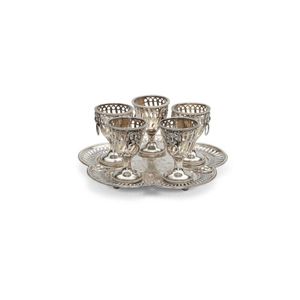Victorian Silver Egg Cruet by George Fox
A fine Victorian silver and gilt egg cruet, by George Fox, London 1864, the tray with engraved central armorial within pierced and beaded border interspersed with lion masks, holding five pierced egg cups with lion mask drop ring handles, diameter 7.09 in., weight 494gms.
You must be a subscriber, and be logged in to view price and dealer details.
Register Now to view actual auction price for this item.
- Victorian Period - The Victorian period of furniture and decorative arts design covers the reign of Queen Victoria from 1837 to 1901. There was not one dominant style of furniture in the Victorian period. Designers used and modified many historical styles such as Gothic, Tudor, Elizabethan, English Rococo, Neoclassical and others, although use of some styles, such as English Rococo and Gothic tended to dominate the furniture manufacture of the period.
The Victorian period was preceded by the Regency and William IV periods, and followed by the Edwardian period, named for Edward VII (1841 – 1910) who was King of the United Kingdom and the British Dominions and Emperor of India for the brief period from 1901 until his death in 1910. - Lion Mask - The lion mask has been used for centuries in various forms of art and design, including furniture, silver, and ceramics, and is usually y depicted as a stylized representation of the face of a lion, often with an open mouth and protruding tongue. and is often used as a handle, knob, or other decorative element.
In furniture design, lion masks were popular in the neoclassical and Empire styles of the late 18th and early 19th centuries. They were often used as decorative elements on the legs or arms of chairs, as well as on cabinet and drawer pulls. It was also used as a handle, knob, or other decorative element.
In silverware design, lion masks were often applied to tea and coffee pots, as well as on candlesticks, snuff boxes, and other small silver items. The lion mask was often used in combination with other neoclassical motifs, such as laurel wreaths or acanthus leaves, to create a sense of grandeur and classical elegance.
In ceramics, lion masks were often depicted in relief, and were sometimes used in combination with other decorative elements, such as garlands or swags. - Engraving - The method of decorating or creating inscriptions on silver and other metal objects by marking the surface with a sharp instrument such as a diamond point or rotating cutting wheel.
- Armorial / Armourial - Bearing a coat of arms. Coats of arms came into general use by feudal lords and knights in in the 12th century, and by the 13th century, arms had spread beyond their initial battlefield use to become a flag or emblem for families in the higher social classes of Europe. They were inherited from one generation to the next. When a family crest is used on individual items of silver or furniture it is an indicator of the aristocratic standing of the family represented.
Armorials were also used to decorate mass produced ceramic souvenir ware by such companies as Goss, Carlton & Shelley, and in these cases the coats of arms displayed were of boroughs and cities.
This item has been included into following indexes:
